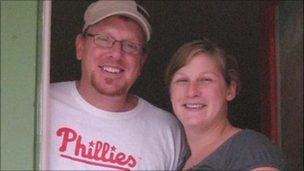US economy: The class of 2001 rues lost opportunities
- Published

Christina and Steve are uncertain about their economic future
As her husband and one year old son sleep peacefully upstairs, Nicole Dahl speaks quietly about the financial hand she has been dealt.
Sitting in her kitchen in suburban New Jersey, the 28-year-old says that she thought she would be "in a different situation than what I am in now; I could have seen myself better off, I think… I think once I graduated, it was kind of a wake-up call."
Nicole is a graduate of Voorhees High School in Lebanon, New Jersey. Ten years ago this summer the school discharged its senior class of 2001 - another group of newly minted young adults ready to join the American work force.
A few months later, the terrorist attacks on September 11 served as a horrific herald to what was the beginning of a decline in the US's financial stability. It was a decade that left a young generation at the mercy of the ups and downs of the economic world.
The Boomers' children
For many, this early decade of adulthood has proven difficult, forcing them to rely heavily on their parents and subsist on patchy and unreliable income. For those lucky few who have managed to maintain gainful employment, there are still feelings of uncertainty and dismay.
Christina Grodkiewicz, 28, is also a graduate of the Voorhees High School class of 2001 and now a ceramics teacher at the school. She and her husband Steve Smith are expecting their first child in a few weeks' time.
"It's the first decade of my adult life," Christina says. "It's all that I know of adulthood. Friends of my parents have said that they don't think that the financial gains that they've had in their lifetime, their kids will ever see because of what's happened."
It's called the millennial generation, the children of the baby boomers, born in the last quarter of the 20th century.
Many employers complain about this generation. Some are difficult, they say, don't accept their place in the workforce; others feel entitled, or are overly ambitious.
Steep competition
It could be argued that this feeling of entitlement is actually a sign of a generation trying to find its identity. From a young age, the Class of 2001 was infused with the belief that the world was theirs for the taking.
This confidence provided them with the tools needed to deftly tackle the hurdles of joining the American middle class: graduating from college, landing a first job, negotiating a car loan or mortgage.
But 10 years into the workforce, the Class of 2001 is a generation faced with steep competition for entry level jobs, pay freezes, and lay-offs at earlier and more dangerous points in their careers, while they are still new to a workforce that was reluctant to hire them in the first place.
Such setbacks are hurting their earning potential for life. Now, their constant struggle with the recession leaves them questioning their role in the American workforce and the ability of the government to find real solutions to persistent economic problems.
'Casualties in the middle'
"We're all expected to control our spending and control our debt," says Christina, "but the people of power that run us, can't control it. So how can they expect us to be able to do that for ourselves, and how do they expect us to respect them and look up to them for guidance?"
"There's no accountability, in my opinion," says her husband Steve. "The left blames the right, the right blames the left, and we're just kind of casualties in the middle."
Steve and Christina may be wary of the economy, but some seeds of optimism are already being sown within the same family.
Christina's brother Devon is a high school graduate of the Voorhees class of 2011. The 18-year-old started investing in the stock market when he was fifteen.
"Pretty much whatever money I make I put into an investment portfolio… it's actually beaten the stock market for the most part for the past couple of years," he says.
Be your own boss?

The class of 2011 will be self-employed, says high school graduate Devon
The Class of 2001 is struggling to find its place in a post-recession adulthood. It has to accept its uncomfortable assignment: set about redefining the American dream and how it manifests itself.
Is it home ownership, financial stability, a disposable income? Or perhaps one of the more intangible but very real American values, autonomy? The right to fulfil a financial potential in the pursuit of happiness?
Devon makes it clear that while the Class of 2001 is cautiously grateful for their employment, the Class of 2011 intends to be their own bosses: "If you get capital investment from an outside source, it's no longer all your company… I didn't want that, I thought if you start really young, I have the potential to make a lot of money before I have to worry about starting this company."
He views the recent uncertainty in the markets as temporary, a symptom of skittish investors and slow US growth.
"The entire investment community is just too fickle," says the 18-year-old. "They see the stock market do something one day so they're going to change what they're doing all based off that single day. By doing that they're making things more volatile than they have to be."
"Right now is the perfect time to put money into the stock market. I'm willing to take that risk, and by taking that risk I'm helping the economy."
"I'm taking a leap of faith hoping that other people will do the same. By obtaining money now I have the potential to use more money to fix that problem, because I'll be one of the better investors."
Recovery
It may take years for the class of 2001 to recover from its formative adult years of economic uncertainty. Its graduates are still struggling to see if the American dream exists for them, just as it did for their parents and their grandparents before them.
"For some, maybe," says Steve. "Not for people like us necessarily. I think we're just going through the motions... . Maybe the American dream has been revised a little bit… and we have something new to hold onto, maybe."
"It has to be," says Christina. "I don't think you could live with yourself if you don't have some kind of a dream."